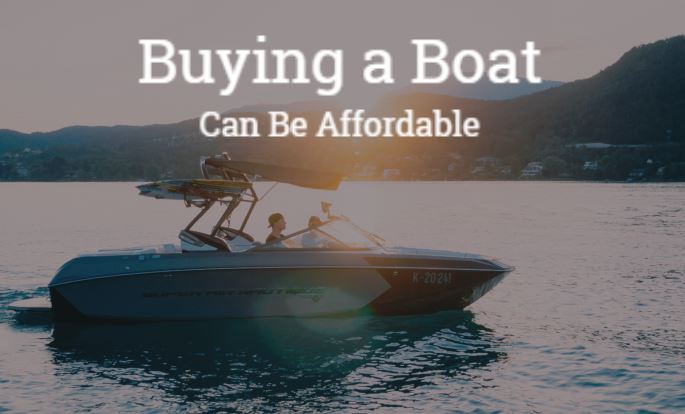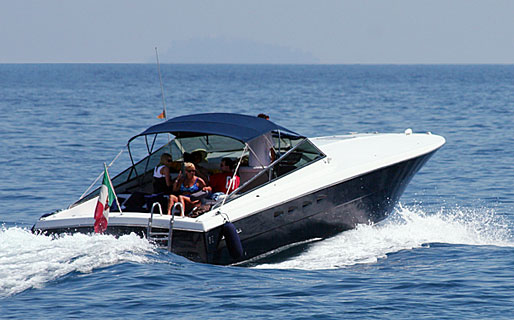
So you’ve been on friends’ boats enough times now to know you just might want one of your own. But what to buy—what sort of boat do you want? What would you use it for? What’s a best-fit for you and your family? What would you do with it when you’re not using it? Of course the toughest question might be saved for last—how much boat can you afford? By DiscoverBoating.com.
Getting organized and answering these questions to the best of your ability is the way to cut the uncertainty down, one question at a time. Here’s some help, so you can focus on your dream—getting out on the water on your own, and maybe even inviting friends aboard.
Upfront Consideration And Costs
Of course there’s the up-front purchase cost of a boat to consider. Before talking money, the first step is figuring out how you want to spend your time on the water. You might want a fishing boat, or a runabout for family fun. Perhaps a cruiser that could house your family overnight for extended trips is the ticket, or a specialty craft like a pontoon boat for family parties and outings at your favorite lake house. Keep in mind some of these types of boats can easily serve several purposes; for example, a pontoon boat with enough power can be the “family truckster” while still performing as a very capable ski/water sports towboat and fishing platform. An offshore style fishing craft can double as a family fun boat if properly equipped.
Visit our Boat Type Selector to help identify the boat style that’s right for you by selecting your preferred activities, number of passengers and more criteria for your ideal boat.
Once you’ve identified favorite activities, calculating how much you want to spend is the next step. How much boat can you afford? Using that number, you can decide how to formulate your boating purchase. If you’re financing the purchase, remember that your credit rating will factor into your purchase; since this is a discretionary purchase, don’t tie up needed cost-of-living funds in your boat. Here are some costs to consider when buying, besides the cost of the boat:
- Trailer: if you need a trailer to transport and store, this could add to the purchase price; sometimes it can be included as part of the package deal (it pays to bargain!). This is common practice at dealerships, boat shows and especially seasonal dealer sales events; when the trailer may mean making the sale for the dealer, it’s often included.
- Insurance: You’ll need at least liability coverage, and likely damage coverage—especially if it’s a newer rig. Often lenders will require comprehensive coverage on a financed purchase. It’s smart money in the long run, in case of accident or theft—your boat is covered!
- Education and License: Most states require some type of boaters’ safety course and operator’s license.
- Storage options: You may want a cover, a top, or maybe even consider renting inside storage if you can’t keep the boat at your home or on your property. Summer and winter storage are two different animals, where the climate is colder. Winter storage in colder climes typically involves winterization prep for engine and boat, as well as durable coverage where snow, rain and winter winds have potential for damage.
- Equipment and accessories: Of course safety gear (life vests, paddle, horn, signal flares, etc.) should be considered as part of any boat purchase. No need to buy everything you can think of all at once; a good plan is to “treat your boat” every spring and fall to a new accessory or upgrade. with accessories like stereos, lighting, ski/watersports towing equipment, etc. Spend wisely and you’ll enjoy your boat and all the summer fun it brings.
Annual And Maintenance Costs
Like a car, a boat purchase also carries yearly maintenance costs, and these can vary widely with the type of boat, how often it is used, whether it’s used in fresh or saltwater, and whether it begins its life with you as new or used.
- Of course a new boat will cost less to maintain than a used one, at least for the first few years. With cars, you have cleaning, oil changes, tire and brake service, cleaning, perhaps a battery replacement, and maybe an alignment. With a boat, you have all the same engine maintenance costs, and cleaning, but add hull maintenance, storage, winterizing (when you don’t use the boat year-round), haul-out (if not keeping in the water year-round), and spring make-ready and launch. Costs for these services can vary widely; some of the determining factors will be the boat and engine size, the local area, fresh or salt water, and the type of storage (inside a building or outside, covered). Of course costs increase with boat and engine size. For example, cost to service and winterize a four-stroke outboard engine of 150 horsepower might be $250, plus cleaning and winterizing the boat another $250. For outside storage, boats are typically shrink wrapped at a cost of roughly $10-15 per foot, so a 21-foot boat might cost $200-300 to cover and make ready for winter. Inside rack storage costs more, as the boat is inside and better protected from the elements. Figure on roughly $50/foot for inside storage, so that 21-footer would cost about $1000 for the winter’s nap.
- A trailer will need basic upkeep as well; tires, brakes, and general maintenance, plus monthly storage fees if you can’t keep it on your property when your boat’s in the water.
- If you keep the boat at a marina, you will incur monthly costs for those months of storage; fees will vary depending on inside or outside storage, how often you use the boat, and whether or not the marina includes cleaning and maintenance charges. Costs for in-season storage range by region and waterway, but a general guideline, in-water dock space can range from $1000 to more than $5000 per season. Indoor rack dry storage costs more, typically 1-1/2 times as much as in-water dock space, but many say it’s well worth it to have the boat stored safely inside a building, ready at the dock when it’s needed, then washed and stored again when finished.
- Using the boat in freshwater will keep maintenance and cleaning costs down considerably. While there’s nothing quite like the feel of salt air on a sunny summer day, salt water is definitely harsher on a boat and engine than freshwater.
Costs In The Real World
Boats can vary in cost as much or more than even cars or homes, depending on size, type, purpose and age. Annual costs for some can vary widely as well. As an example; a local neighbor, a plumber, has an extremely active boating life with a 12-year old 19-foot open bay skiff with 115-hp outboard; he maintains it carefully and fishes nearly every weekend in the summer season. This boat costs him minimally to maintain, as he has local mechanics keep it going for him, and he stores it on its trailer in his driveway. On the other side of the fence, another boating friend keeps her boat at the local marina, has them maintain it, and trades up to a larger boat every few years or so. Her boating expenses far outweigh my neighbor’s, but she has a different boating lifestyle and therefore different boating needs. Here are some ways to keep costs in check:
- Save for your boat and pay in cash, thereby keeping loan interest costs away
- Buy used; shop carefully for a 2 to 10 year old boat, saving many thousands on the purchase price. Boats that are more than a decade old are still great candidates for purchase; however, just like when buying a classic car, more investigation and review should be in order to ensure the background and viability of the hull, engine and drivetrain.
- Buy only the size boat you need; avoid buying larger if you truly don’t need it. For example, if you anticipate outings by yourself or with your partner, or maybe with perhaps a couple more friends, there’s no need for a huge party boat that can handle a dozen or more. Similarly, if you envision quiet fishing trips on smaller lakes, no need to focus on larger boats capable of long offshore outings.
- If you’re handy with tools and a good mechanic, you can perform many of the maintenance and service tasks yourself; saving money over having marine mechanics do the work you need. This is a tricky area; first, be sure your efforts don’t invalidate any potential warranties. Second, being handy at plumbing or home wiring doesn’t typically translate to marine repair expertise. That being said, if you’re mechanically inclined and have good experience in auto repair and home repair, you’re probably capable of tackling most simple boat maintenance tasks.
- Keep your boat at home, on the trailer, and launch when you want—as opposed to keeping it at the marina, saving monthly costs as well as maintenance fees.
- Remember that fuel costs can vary widely; marina fuel sold dockside can be much more expensive than gas sold at the highway station. Be careful about ethanol-extended fuels (E10 and now E15). While today’s marine engine fuel systems are better suited to handle alcohol in fuel, too much is not a good thing. To err on the safe side, marina gas is typically available ethanol-free; even though it costs more, it may save in maintenance and repair costs in the long run. Remember also that boats stored with fuel in them should have the fuel treated for storage if they’re sitting for more than a couple months. Otherwise the stale fuel turns bad and can gum up fuel injectors and filters.
Above all—boats are fun, and can be great gathering places for family enjoyment. If you do your research and plan ahead, you’ll be out on your boat in the summer sun before you know it. Ahoy!
View original article here.
Reposted by Scott Freerksen “The Lake Guy”
